 |
 |
 |
 |
 |
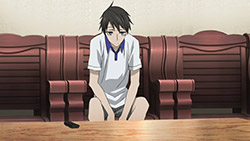 |
 |
 |
 |
 |
 |
 |
 |
 |
 |
 |
 |
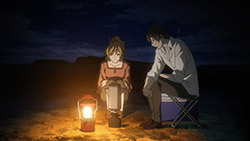 |
 |
 |
 |
 |
 |
 |
 |
 |
 |
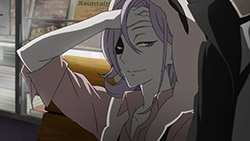 |
 |
 |
 |
 |
 |
 |
 |
 |
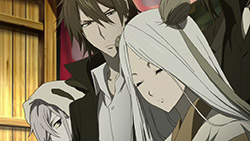 |
 |
 |
 |
 |
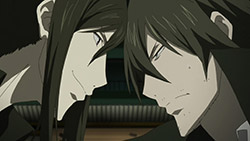 |
 |
 |
 |
 |
 |
 |
 |
 |
 |
 |
 |
 |
 |
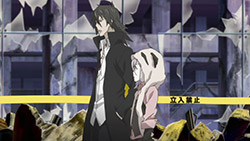 |
 |
 |
 |
 |
「因果論」 (Inga-ron)
“Episode 0”
The passage of time has only increased my appreciation for UN-GO.
As anime in general has trended towards xenophobia and nationalism, BONES has provided a welcome contrary perspective. Specifically, writer Aikawa Shou has been a standout – first with UN-GO and now with Eureka Seven: Astral Ocean, he shows a rare touch with political satire and biting commentary, quite a contrast to the clumsy and simplistic work of writers like Yoshino Hiroyuki. BONES has always had a more humanist and tolerant strain in their work, more suspicious of the military and nationalism than other studios, and in adapting Sakaguchi Ango’s novels Aikawa-san has found a perfect vehicle to comment on the state of the world today, and the possibilities he sees for the future.
While UN-GO was far from a perfect series it’s one that always held up better upon consideration, the true subtlety and grace of an episode only becoming clear after reflecting on it for a bit. I appreciate its unwavering refusal to be conventional or to make it easy on the viewer, and I think this is certainly reflected in the fact that this “Inga-ron” film was only released after the series. Without question, the series would have been a very different experience if it had opened with this as a two-part episode – so much that we had no choice but to leave to conjecture would have been known, and the context it provides would have changed the way we perceived many, many elements of the show. I’m not going to say it was a good decision or a bad one to give us exposition only after the fact, but it was certainly an interesting and unconventional one. And UN-GO has always, through its good moments and bad, been those two things at least.
While (as you would expect) this film has an unusual narrative style, jumping back and forth between several time periods, in substance it’s more or less what you probably expected – a pretty thorough explanation of how Shinjurou met Inga, and how be became the man we know today. There were hints of this in the series but now those hints are given specific form. Shinjurou was an orphan, dedicated to trying to find a way to help others. He was a superb competitive swimmer, but abandoned the sport when he realized he wasn’t good enough to win medals for his country. Eventually he decided that he could change the world through film – by taking movies into war zones and poverty-stricken places where the local children had never seen them. Eventually this work takes Shinjurou to an unspecified battleground, where his path crosses with the musical group “Singing on the Battlefield” likewise trying to make a difference in terrible places in their way. At least superficially.
At the heart of UN-GO is an odd contradiction – a strong belief in the darkness of the human soul and that the world is a place where humans are constantly doing terrible things to each other, yet also a sort of blind faith that redemption is possible, and that decency will always survive and provide its own rewards. Shinjurou himself provides much of that redemptive quality to the series of course, though even as the young man in the war zone he’s already become quite cynical that anyone can really make a dent in the horror that is existence – and he projects his disillusionment with his own efforts into gently mocking Singing on the Battlefield, specifically Kurata Yuuko (Tomatsu Haruka), disappearing into a role as only she can). She’s the young woman with whom he feels an undeniable romantic spark, a seeming idealist. The group also consists of Shinjurou’s old swim club teammate Serada Makirou (Kawashima Tokuyoshi), and their leader, Oono Myoushin (Suwabe Junichi), among others.
Here’s were Aikawa-san’s and Sakaguchi’s-san’s inherent distrust for authority kicks in, as it turns out Serada is actually a member of the SDF, and he’s infiltrated SotB specifically to lead them into a trap, where there deaths at the hands of “terrorists” will lead Japan into the war officially. It’s after the trap has been sprung and Shinjurou’s van has crashed in a cave that the UN-GO we know intersects with this past, as Shinjurou is mortally wounded when the van explodes – but his body is possessed by a strange spirit who declares its intent to feed on souls at long last. This is a harrowing scene, the best in the film, as Shinjurou and the being we’ll know as Inga wrestle for control of his body and Inga eats the souls of the SotB members – all but Serada, who’s disappeared. Inga tells Shinjurou later that the human soul actually consists of screams, saved up the way a camel stores water in its hump. As the musicians die they reveal the truth of their desires, and they’re all ugly – all except Yuuko, who decides that she’ll kill herself before she allows her truth to be revealed – and does so with the jagged neck of a broken guitar. But as she dies Inga jumps to her body, and the quick-thinking Shinjurou strikes a deal – his body will be forever off-limits to Inga, and he will provide Inga truths to eat – but Inga must leave the soul behind, and he must never take Yuuko’s form. The hungry spirit, far removed from its own time, agrees and the stage is more or less set for the UN-GO we come to know in the TV series.
This being UN-GO we have a mystery to solve, and it’s the link between that scene in the cave and the “present” that we see in the series. A cult has formed, led by Oono, and Shinjurou – by this time already a detective (in order to keep Inga well-fed) has been asked by Izumi and Seigen to solve the mysterious deaths of many of its members. Here another mystery of the series is explained – the existence of Bettenou, the strange God who grants her “Master” the power to turn their words into reality. Shinjurou’s suspicions about who the real survivor of that day was are proved true, and the existence of both Inga and Bettenou is given elegant explanation by Serada – they were deities Japanese soldiers carried with them long ago to far away lands, broken and forgotten when those soldiers died and never returned. It was the blood of Shinjurou and Serada that brought them back to life in that cave – but Inga is not a true God but a demon, created by the regrets of all those fallen soldiers and sealed by Bettenou. Is this true? It might well be, though I can’t say for certain – and I don’t think it really matters. What is certain is that Serada – like those we will meet later – becomes arrogant at the taste of the power Bettenou gives him, and forgets the limitations of that power. As all those who taste great power eventually do…
The poetry of this, for me, is that God or youkai, Inga is the right sort of being for Shinjurou. A scraggly, unkempt and cynical man would have no use for a true God – “I’d rather choose a demon over a God with nothing but words.” What Shinjurou has learned is that the best path for him is to devote his life to the practical, and that it’s possible to do so without sacrificing his ideals entirely. Actions matter, not words – and compromise is the inevitable toll that must be paid. This is even apparent in his identity itself – the name Shinjurou Yuuki is a gift from Kaishou, as the man we will later know by that name had to “die” to take the fall for what happened with the cult. The world is crawling with liars…
If anything was ever certain, it was that UN-GO would be a commercial failure – despite BONES and the presence of Aikawa-san and elite director Mizushima Seiji, there was never a reason why this series would find a large audience. What possessed BONES to make it in the first place is beyond me but I’m certainly glad they did, as there hasn’t been another anime quite like it and it’s a show whose considerable merits will be remembered far longer than it’s shortcomings. We’ll likely never see another incarnation of UN-GO in anime form, but we’re better off to have this excellent film to put the show in perspective, even after the fact.
ED2 Sequence
 |
 |
 |
 |
 |
 |

Sweet, this is out? Time for me to go watch it…
I was hopping for some romance with Yuuko.
Me too, too bad the most sweet time between the two is when they slept together. Yes, ONLY slept together…
Finally, it is out! Now I am curious on what his real name was…..but I suppose that does not matter much anymore since he got a new one,but still……
I wonder how this show would do in the states.
Interesting question- although I very much doubt that a show created by an American dealing with similar thematic spheres would also be similar in substance; many things about UN-GO are so fundamentally Japanese- the philosophies that are the backbone of this show are grounded in a decidedly Japanese worldview; which comes as no surprise due to the fact that the entire premise was based on the writings of a Japanese novelist and thinker, Sakaguchi Ango.
We Americans just don’t think like the Japanese do; it would be difficult for an American to recreate something that is exactly like UN-GO in substance (Substantive views, philosophies, etc.), even if its form is similar (Thematic forms; framework). Whether something with a similar form would sell well here in the states is questionable, although I suspect that the result wouldn’t be all too different; shows that deal with deep philosophical and social themes are by their very nature notoriously inaccessible; a high level of sophistication is requisite to being able to fully understand these shows, in most cases (Horizon has this problem too, although to a far lesser degree). But you never know, there may be some genius out there who is able to present traditionally “niche” themes in a way that is somehow still massively appealing…
I think that it would be salable here if distributors know how to sell it.
I think that, generally, Anime includes a little bit many things piled together that makes it difficult to directly label it in a neat category. I know that anime genres can be easily marked as “this is Super Robot anime” or “This is shonen, action-y superhero-like anime,” but when it’s watched as a whole the entire experience includes more things that you thought would have.
I’d like to think that Un-Go would be interesting to show in a movie theater and advertised as such, with a (hopefully) intelligent commercial that states “this is a mystery-themed supernatural film that has elements of intrigue mixed with philosophy as well as issues of globalism and nationalism.”
Realistically, it’ll not be like that. But it says much on how business operates rather than the efforts made to directly make it interesting for American viewers who might like this sort of thing. And be rated PG-13 or R for edge.
“this is a mystery-themed supernatural film that has elements of intrigue mixed with philosophy as well as issues of globalism and nationalism.”
Unfortunately, a film with that description would do very little business if it were live-action. Animated it wouldn’t eve get made, never mind given a wide release.
Unfortunately I don’t see any way, in any country, that UN-GO would ever be popular. It’s intellectual, subtle, dark, and quite weird (and not especially pretty) visually. It happens to be the best anime focused mainly on political themes in years, but that’s just not the ticket to commercial success.
Word; contrarily that also happens to be exactly why this is my favorite show of 2011, followed closely in second place by Horizon.(Disclaimer: Emphasis on personal favorites, it is not the same as best, which has more to do with objective quality)
Oh how cute he was as a child <3
that ID shows Shinjuuro’s D.O.B. as September 11th, 2001. I can’t think that Kaishou gave that to Shinjuuro by accident. Those small details really make this series great.
Heh, good catch.
I’m not japanese, so I’m wondering, can’t yuuki shinjuro (not kanji, but pronunciation) mean something like first brave son of truth?
Oh good. I’m not the only one that has picked up on the xenophobia and nationalism pervading a lot of anime these days. I find that shit so tiresome and narrow minded. Then again the US doesn’t exactly provide a shining example of a global oriented society.
The writer you mentioned- Yoshino Hiroyuki. I didn’t know that guy’s works but having found “Guilty Crown” and “Code Geass” under his portfolio . . . fuck that explains a lot. That connects a lot of dots for me. Thank you for giving me a name in the anime industry to stay wary of.
Glad these guys made something like Un-Go. It shows at least a section of the anime industry has their heads screwed on properly.
And then there’s Towa no Quon, too, which also has a very humanist and environmentalist bent. BONES has always been something of an outlier when it comes to politics in anime (GAINAX to some extent too) but it just seems more obvious now.
I’d thought maybe the whole fiasco with Ishihara and Bill 156 might have wised the industry up about cozying up to nationalists, but I don’t see the evidence for that yet.
The anime may not have the best mystery but its storytelling is top-notch.
Some people I know, who watched it mainly because it’s a mystery anime, were disappointed.
But what good is a ‘good mystery’ anime if the script writing is mediocre?
… So, what is “-ron” for? If it’s an honorific, I am unfamiliar with it. Can someone explain?
Inga means karma, ron means theory/doctrine, add the two together and you have the title to the film.
Thank you ^^
Damn I would’ve watch this if not due to college….
It was always a real pleasure reading your posts after watching the UN-GO eps. as my brain would always be in overdrive trying to wrap itself around all the information and subtleties of the amazing script and character interactions it continuously delivered. You always broke things down in an organized way and pointed out lots of tidbits that I overlooked and it was nice having a blogger be so thorough and enthusiastic about this gem that will never get the recognition it deserves.
I find it hard to justify rewatches to myself when I always have so much backlog and trouble even keeping up with the current season, but the whole perspective change this throws over the whole series will have me making time for another run-through soon.
Thanks Xin, this was a good series to cover. Always lots to discuss.
Just finished this.
Was expecting this to be a lot “darker”, to be completely frank. A bit underwhelming (I get the feeling, as with the series, that quite a bit was left out from the original works) but still rather entertaining.
Thanks for blogging this, Guardian Enzo.
Made me want to see the series all over again!
An excellent OVA and thanks for blogging it, Enzo! I was happy to see Bettennou again. She looks quite frightening when entering “god mode”. Inga was cute when he shyly asked Shinjurou if he would have preferred to find Bettenou instead of him (with Bettenou sitting on Serada’s lap next to them)!
Had already forgotten the details of the series.
Dug up details of Inga-ron last year but never go round to look for the connection of the past and present, thats the missing part not in the JA wiki at that time.
Then as time past I kind of forgotten about Inga-ron and UN-GO.
Thanks for the reminder, Enzo 😛
Having seen this I kind of compare Bettenou and Kaishou Rinroku.
Both have the power to make their words the truth.
I would like to know more about Kaishou Rinroku.
How he came to have the authority.
Shaggy Yuki reminds me of Hei from Darker than Black.
[quote]The passage of time has only increased my appreciation for UN-GO.[/quote]
Hah, I have the same exact feeling. In hindsight, of the slew of mystery shows we had last year, this was clearly the best one. While the show did have some flaws, it nonetheless stayed with me and I could say it became one of my favourite shows of last year. The worldbuilding, the political commentary, the characters, all blended together to form a very interesting and engaging series. Your blog posts also helped reflect me on a lot of things, so thank you for that. Interesting to know as well that the writer from Un-go is working on Eureka Seven now; thinking about it, I do see the similarities. It’s a good thing there’s still people willing to call things like xenophobia and nationalism in question, because it does irk me a lot (both from anime and American shows/movies, which are also quite saturated with it).
But I digress. Inga-ron finally gave us the final pieces of the puzzle about both Shinjirou’s past, Inga’s existence and the cult that once held Bettenou, and it did not dissapoint. This movie kept all the things that made the series good and it was fun seeing all the characters again; even if it was for the final time. And indeed, knowing the things we do now about the show, it does put certain things in a different perspective (Inga and Shinjirou’s relationship for one, and Kaishou is an even bigger bastard than he already was).
Too bad there was no Kazamori cameo though, she was awesome.
Remember the girl Rinroku’s daughter said she taught she knew Shinjirou from somewhere in the series than at the end of this movie she sees his picture when her father was working on the computer. There was little bits of details that could make you realize something that you didn’t understand before . i don’t know why people didn’t like this series such a shame the anime was very interesting >_>